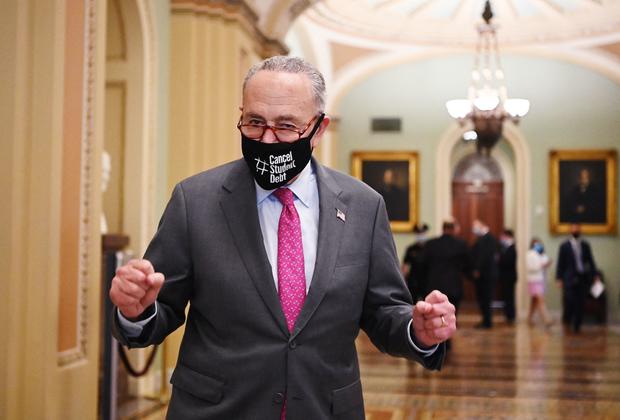Senate passes $1 trillion infrastructure bill in strong bipartisan vote
Washington — The Senate voted to approve a roughly $1 trillion bill to revamp the nation's infrastructure on Tuesday, delivering a bipartisan breakthrough on legislation that includes key portions of President Biden's domestic agenda.
The final vote was 69 to 30, with 19 Republicans joining all 50 Democrats in voting for passage. Senate Minority Leader Mitch McConnell was among the Republicans who voted yes. Vice President Kamala Harris presided over the final vote, and said it was "a very good day" before entering the chamber.
The legislation, known as the Infrastructure Investment and Jobs Act, came together after months of talks between a bipartisan group of senators and the White House that at times appeared on the brink of collapse.
"It's been a long and winding road, but we have persisted and now we have arrived," Majority Leader Chuck Schumer said before senators voted. "There were many logs in our path, detours along the way, but the American people will now see the most robust injection of funds into infrastructure in decades."
Mr. Biden thanked senators for approving the bill in remarks later in the day, saying it "proved that democracy can still work."
"The death of this legislation was mildly premature, as reported," the president joked. "They said they were willing to work in a bipartisan manner, and I want to thank them for keeping their word. That's just what they did. After years and years of an infrastructure week, we're on the cusp of an infrastructure decade that I truly believe will transform America."
The bill, which now heads to the House, prioritizes funding to enhance the nation's roads, bridges, highways, water and broadband infrastructure. House Speaker Nancy Pelosi has said the lower chamber won't take up the bipartisan bill until the Senate passes a separate $3.5 trillion budget package that includes provisions to fight climate change and boost domestic spending on health care, child care and more.
Progressives in the House have threatened to withhold their support of the bipartisan measure unless the Senate approves the $3.5 trillion package, which could take months to be finalized. The Senate immediately voted to advance the budget resolution that paves the way for the larger bill, kicking off a marathon "vote-a-rama" on amendments that stretched into the wee hours of Wednesday.
Ahead of Tuesday's earlier vote, GOP Senator Rob Portman of Ohio, one of the lead negotiators, touted the collaborative process behind the crafting of the infrastructure bill, which he said showed that bipartisanship still exists in the Senate.
"To me, not only does this investment make sense, but importantly, what we are doing here today also demonstrates to the American people that we can get our act together on a bipartisan basis and get something done," Portman said. "We can do big things on a bipartisan basis if we put our minds to it."
The bipartisan bill passed Tuesday would inject $550 billion of new federal spending over five years into improving the nation's infrastructure. The legislation dedicates $66 billion for rail transportation and safety, $55 billion for water infrastructure and $65 billion for increasing and improving broadband connections. In addition, the legislation includes $7.5 billion to build electric vehicle charging stations, which is far less than what Mr. Biden originally sought. The bill would allocate $15 billion for lead pipe replacement, which also falls short of the $45 billion Mr. Biden initially requested.
The upgrades to the nation's infrastructure will be paid for through a variety of measures, including repurposing $200 billion that was allocated by Congress for earlier COVID-19 pandemic relief. The legislation estimates that approximately $53 billion will be available from states that canceled their enhanced federal unemployment insurance benefits. In addition, the measure also requires cryptocurrency "brokers" to report their transactions to the IRS.
Over the past few days, disagreements arose over who would be defined as a cryptocurrency "broker," and Republican Senators Pat Toomey of Pennsylvania and Cynthia Lummis of Wyoming sought unanimous consent on Monday to amend the legislation to narrow who would have to report transactions. But senators objected, and the amendment did not receive a vote.
The Joint Committee on Taxation released its analysis of the bipartisan infrastructure bill last week and estimated that the bill would generate $51 billion in revenue over 10 years. The Congressional Budget Office (CBO) estimated that the legislation would add $256 billion to the deficit over a 10-year period, given increases in spending.
The CBO analysis solidified concerns among some conservatives that the bill would not be fully paid for. Republican Senator Mike Braun of Indiana said in a statement last Thursday that the CBO scores showed that the provisions to pay for the legislation are "either phony or insufficient," and he urged Republicans to not support a "bloated debt bomb parading as an infrastructure deal." However, Braun was not among the Republicans who had said they would support the bill.
Portman and Democratic Senator Kyrsten Sinema of Arizona, both key negotiators in the bipartisan infrastructure group, said in a joint statement last week that not all funding sources are considered in the CBO's model and that their legislation has $519 billion in offsets.
"The new spending under the bill is offset through a combination of new revenue and savings, some of which is reflected in the formal CBO score and some of which is reflected in other savings and additional revenue identified in estimates, as CBO is limited in what it can include in its formal score," they said in the joint statement.
The Senate considered 22 amendments, 13 of which were offered by Republicans. But lawmakers failed to reach an agreement on additional amendment votes starting last Thursday to complete the process sooner, with Republican Senator Bill Hagerty of Tennessee objecting, citing the CBO score.
The bipartisan bill represents the first part of a two-track process, with the second being the broader piece of legislation with a price tag of $3.5 trillion. That package can pass with only the support of Democrats using a process known as budget reconciliation. All 50 Democrats must remain united for the measure to be adopted, since no Republicans are expected to support it.
The $3.5 trillion budget resolution is a blueprint for Mr. Biden's larger domestic economic agenda, and includes funds to expand Medicare and child care and combat climate change. In addition, the budget resolution also instructs the Senate Judiciary Committee to work on developing a solution for "lawful permanent status for qualified immigrants."




